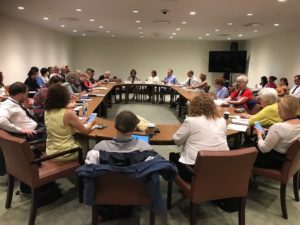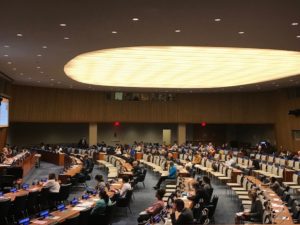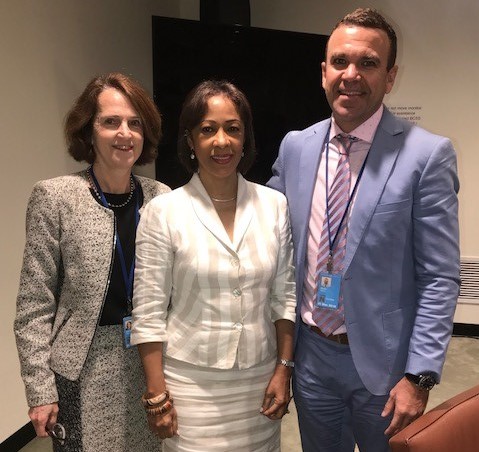Global Ageing Network played a prominent role in the meetings of the Open Ended Working Group on Ageing (OEWG) at the United Nations in late July. In a statement to the member states, board member Marcus Riley said, “It is our responsibility as a global society to be more aware of the risks and challenges for older members of our community such as the uncertainty of access to quality long term care and palliative care as well as threats to people’s independence and autonomy… Our systems governing long term care must provide choice and opportunities…”
Marcus Riley and Katie Smith Sloan presented at a standing-room-only event for NGO’s on palliative and long term care. Smith Sloan noted that “it is incumbent upon us to acknowledge the role families and others play – and to support them – with training, if possible and respite because the work is demanding – and financially, if public support is available. Without families and neighbors, circumstances for older adults would be markedly different everywhere. We also need to address the stark discrepancy in palliative care options globally. A recent study by the World Health Organization on the status of palliative care in 234 countries highlighted that it was well-integrated into health care systems in only 20 of them; 42% have no delivery system for palliative care services at all, and in 32% service delivery reaches only a small percentage of the population. Some 80% of the world’s population lack adequate access to medication needed for palliative care. The great variability from country to country is largely due to lack of medical knowledge on the part of health care professionals and access to drugs. That said, there is a great opportunity for increased education and training so that no one has to live with pain if that is their choice. Palliative care has been proven to work. More should have the opportunity to live out their later years pain free.”
Marcus Riley described the academic research in Australia on happiness, which has demonstrated that it is possible for people to maintain independence and autonomy even in a high-care environment. His organization, Ballycara, has developed SONA, a program that involves deep engagement with residents to understand their passions and interests, individualized programming and motivation to ensure an individual’s purpose is realized. At a local or country level, it has proven possible to achieve what it is hoped that our governing systems will foster – a focus on choice and enablement for all older adults.
Global Ageing Network continues to join other NGO’s and several member states in pressing for a Human Rights Convention on Human Rights and the Elderly – a legally binding instrument that would, among other things, ensure access to quality care, services, and supports for all older adults.


You need to login in order to like this post: click here

